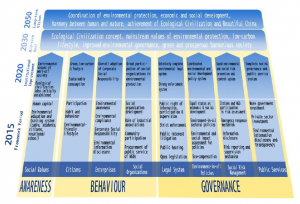New report from CCICED on China’s environmental protection and social development
At the annual meeting 13 to 15 November 2013 in the China Council for International Cooperation on Environment and Development (CCICED) a Task Force for China’s environmental protection and social development launched a summary report with 6 recommendations for how to ensure development of an “Ecological Civilisation”. This vision includes a harmonious society, sharing the fruits of development and safeguarding social justice and equity, but there is an urgent need to deepen the currently weak understanding of environmental and social relationships, and to identify priority fields for action in order to achieve this vision.
The task force operates with a framework for policymakers: 1) Awareness, 2) behaviour and participation, and 3) coordinated governance. The report points to the more soft topics in the necessary transformation of the Chinese society with focus on sustainability and environmental protection, and it sets up a model for how environmental behaviour, public environmental governance and environmental values can be coordinated and jointly developed.
The six recommendations from the Task Force starts with a recommendation on elaboration a vision of coordinated social, economic and environmental development for 2050 and development of a phased plan of policy and actions for the period to 2020. The recommendations also points to a number of activities within the next years to strengthen the long-term vision and the practical next-steps towards more environmental awareness, behaviour and governance. As example, the report suggest that the next five-year plan should be listed as the National Economic, Social and Environmental Development Plan, so that environmental policy and the associated planning will become a significant item in parallel with economic and social policies. Also and Environmental Impact Accessments (EIAs) should be introduced for major policies.
The Task Force comprises both Chinese and international experts, including high-level people from the Research Office of the State Council and from the Energy Research Institute under NDRC. It is definitely worth reading. Find the report at CCICED website.

